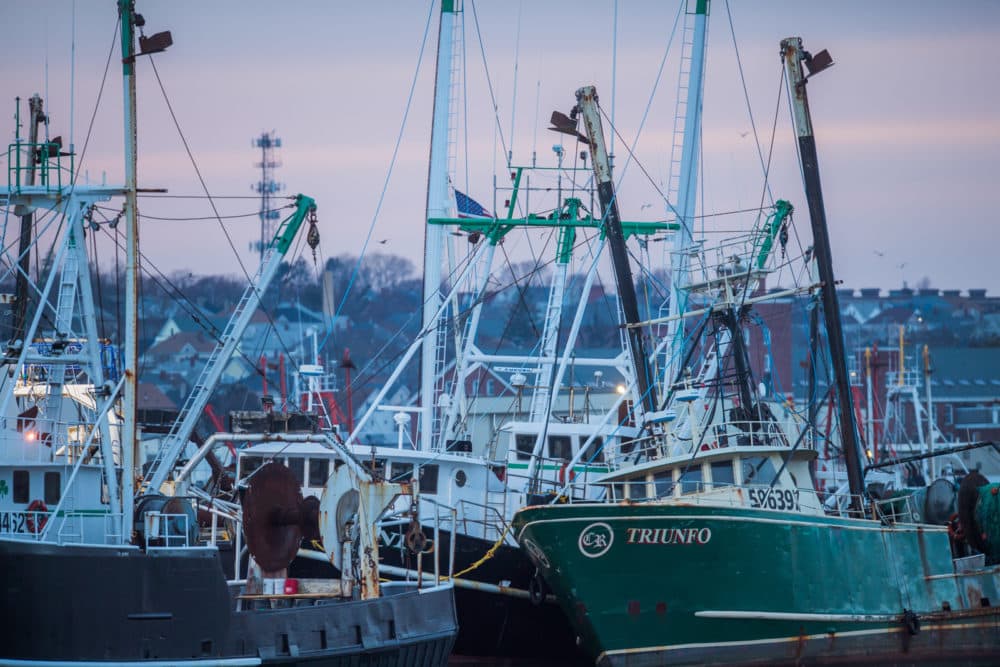Advertisement
America’s biggest scallopers want changes to regulations preventing consolidation

Local scallopers have crowded a series of public meetings this spring to fight a regulatory change under consideration they say could fuel further corporate consolidation in their industry, hurting not only fishing crews and their captains, but the legions of shoreside businesses that service their boats.
The proposed change, in the earliest stages of consideration by the New England Fishery Management Council, would allow boat owners to lease their government-granted access to scallop grounds out to other vessels, potentially opening the door for large commercial fishing operations to circumvent existing ownership caps and increase their already substantial share of the scallop market.
“The bottom line is this proposal is about global control, from the switch to the fish to the dish,” said Alan Cass, a former New Bedford scalloper who began his career as a deckhand and retired as a boat owner. “The resource will be at the mercy of a consolidated effort by these corporations to control ocean-to-table and economically injure the small entities in this industry.”
For nearly 30 years, scallopers like Cass and his son, who followed him into the industry, have gone to sea under a set of regulations that limit both the amount of scallops that can be harvested each year and the share of that harvest that belongs to the industry’s biggest players.
The arrangement, though complex to navigate, has kept a large class of independent fishermen competitive in a global industry alongside corporations with larger fleets and in-house processing and distribution services.
Many of the nation’s largest scallop companies are now pressuring regulators to revise the fishery’s long-standing regulations to allow the allocations assigned to individual boats to be offered for lease on a newly created market.
Proponents say the change could help smaller scallopers too. If a boat breaks down, for instance, or is unable to fish for other reasons, a permit holder could still make money by leasing their scallop allocation to other operations.
Roy Enoksen, the president of Eastern Fisheries and a co-owner of the nation’s largest scallop fleet, said leasing would allow him to stack scallop allocations onto more efficient vessels and save on maintenance costs.
“All that I want to do is put two permits on one boat, not fish any more than those two permits did before,” Enoksen said. “Nobody’s trying to take advantage of anybody.”

Local scallopers have crowded a series of public meetings this spring to fight a regulatory change under consideration they say could fuel further corporate consolidation in their industry, hurting not only fishing crews and their captains, but the legions of shoreside businesses that service their boats.
The proposed change, in the earliest stages of consideration by the New England Fishery Management Council, would allow boat owners to lease their government-granted access to scallop grounds out to other vessels, potentially opening the door for large commercial fishing operations to circumvent existing ownership caps and increase their already substantial share of the scallop market.
“The bottom line is this proposal is about global control, from the switch to the fish to the dish,” said Alan Cass, a former New Bedford scalloper who began his career as a deckhand and retired as a boat owner. “The resource will be at the mercy of a consolidated effort by these corporations to control ocean-to-table and economically injure the small entities in this industry.”
For nearly 30 years, scallopers like Cass and his son, who followed him into the industry, have gone to sea under a set of regulations that limit both the amount of scallops that can be harvested each year and the share of that harvest that belongs to the industry’s biggest players.
The arrangement, though complex to navigate, has kept a large class of independent fishermen competitive in a global industry alongside corporations with larger fleets and in-house processing and distribution services.
Many of the nation’s largest scallop companies are now pressuring regulators to revise the fishery’s long-standing regulations to allow the allocations assigned to individual boats to be offered for lease on a newly created market.
Proponents say the change could help smaller scallopers too. If a boat breaks down, for instance, or is unable to fish for other reasons, a permit holder could still make money by leasing their scallop allocation to other operations.
Roy Enoksen, the president of Eastern Fisheries and a co-owner of the nation’s largest scallop fleet, said leasing would allow him to stack scallop allocations onto more efficient vessels and save on maintenance costs.
“All that I want to do is put two permits on one boat, not fish any more than those two permits did before,” Enoksen said. “Nobody’s trying to take advantage of anybody.”
This story is a production of New England News Collaborative. It was originally published by The Public's Radio.